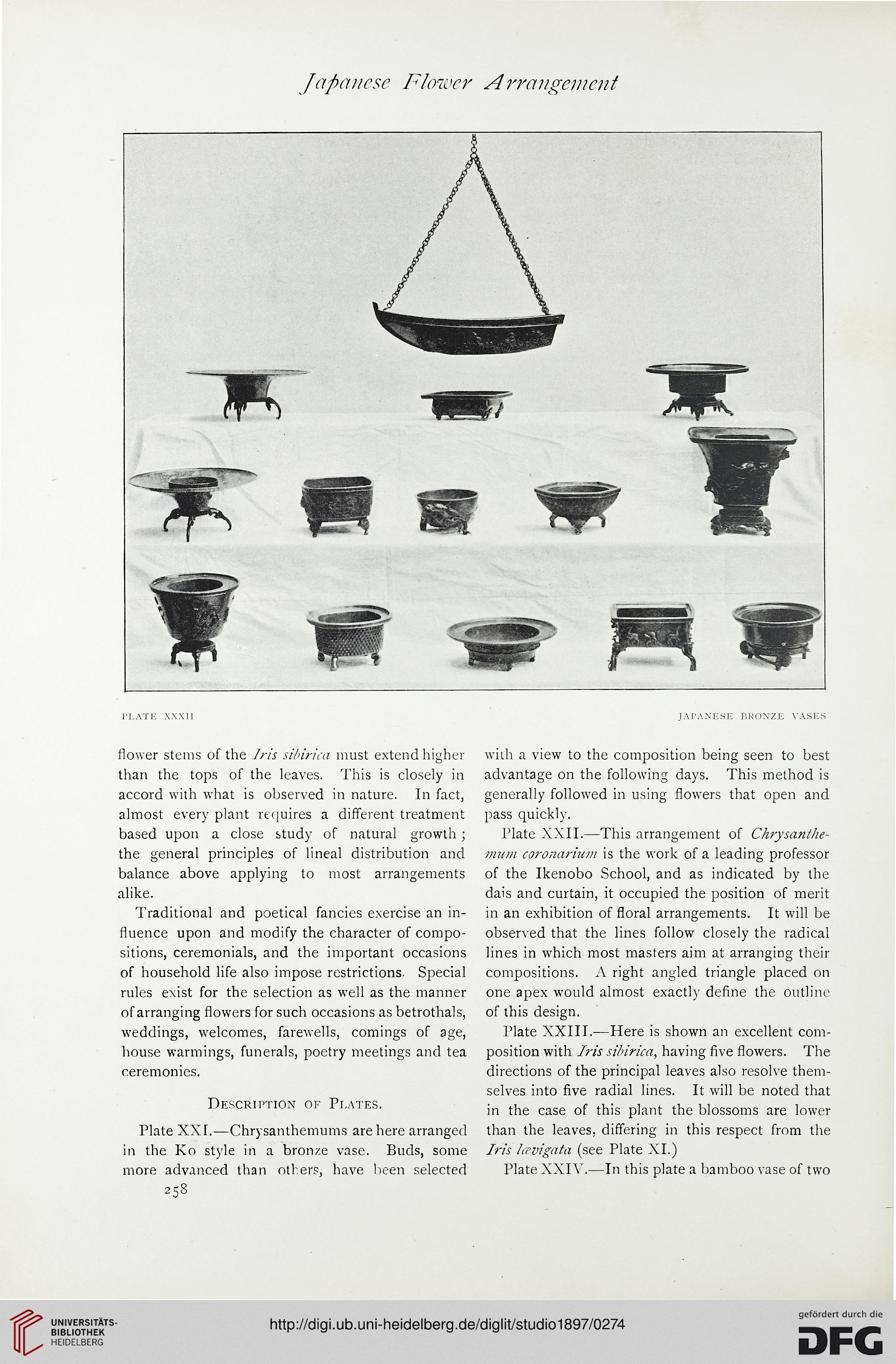Japanese Flower Arrangement
PLATE XXXII JAPANESE BRONZE VASES
flower stems of the Iris sibirica must extend higher with a view to the composition being seen to best
than the tops of the leaves. This is closely in advantage on the following days. This method is
accord with what is observed in nature. In fact, generally followed in using flowers that open and
almost every plant requires a different treatment pass quickly.
based upon a close study of natural growth ; Plate XXII.—This arrangement of Chrysanthe-
the general principles of lineal distribution and mum coronarium is the work of a leading professor
balance above applying to most arrangements of the Ikenobo School, and as indicated by the
alike. dais and curtain, it occupied the position of merit
Traditional and poetical fancies exercise an in- in an exhibition of floral arrangements. It will be
fluence upon and modify the character of compo- observed that the lines follow closely the radical
sitions, ceremonials, and the important occasions lines in which most masters aim at arranging their
of household life also impose restrictions. Special compositions. A right angled triangle placed on
rules exist for the selection as well as the manner one apex would almost exactly define the outline
of arranging flowers for such occasions as betrothals, of this design.
weddings, welcomes, farewells, comings of age, Plate XXIII.—Here is shown an excellent corn-
house warmings, funerals, poetry meetings and tea position with Iris sibirica, having five flowers. The
ceremonies. directions of the principal leaves also resolve them-
selves into five radial lines. It will be noted that
Description of Plates. in the case of this p]ant the b]ossoms are lower
Plate XX [.—Chrysanthemums are here arranged than the leaves, differing in this respect from the
in the Ko style in a bronze vase. Buds, some Iris hcvigata (see Plate XI.)
more advanced than others, have been selected Plate XXIV.—In this plate a bamboo vase of two
258
PLATE XXXII JAPANESE BRONZE VASES
flower stems of the Iris sibirica must extend higher with a view to the composition being seen to best
than the tops of the leaves. This is closely in advantage on the following days. This method is
accord with what is observed in nature. In fact, generally followed in using flowers that open and
almost every plant requires a different treatment pass quickly.
based upon a close study of natural growth ; Plate XXII.—This arrangement of Chrysanthe-
the general principles of lineal distribution and mum coronarium is the work of a leading professor
balance above applying to most arrangements of the Ikenobo School, and as indicated by the
alike. dais and curtain, it occupied the position of merit
Traditional and poetical fancies exercise an in- in an exhibition of floral arrangements. It will be
fluence upon and modify the character of compo- observed that the lines follow closely the radical
sitions, ceremonials, and the important occasions lines in which most masters aim at arranging their
of household life also impose restrictions. Special compositions. A right angled triangle placed on
rules exist for the selection as well as the manner one apex would almost exactly define the outline
of arranging flowers for such occasions as betrothals, of this design.
weddings, welcomes, farewells, comings of age, Plate XXIII.—Here is shown an excellent corn-
house warmings, funerals, poetry meetings and tea position with Iris sibirica, having five flowers. The
ceremonies. directions of the principal leaves also resolve them-
selves into five radial lines. It will be noted that
Description of Plates. in the case of this p]ant the b]ossoms are lower
Plate XX [.—Chrysanthemums are here arranged than the leaves, differing in this respect from the
in the Ko style in a bronze vase. Buds, some Iris hcvigata (see Plate XI.)
more advanced than others, have been selected Plate XXIV.—In this plate a bamboo vase of two
258




